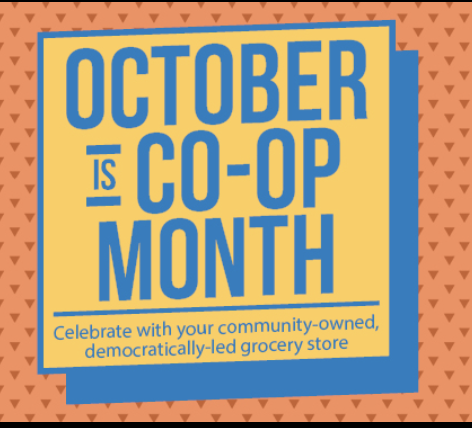Issues & Analyses: Becoming Human – Cultivating Cooperative Communities

Photo:: Marquette Food Coop
It’s Cooperative Month! And here in Western Massachusetts we are super fortunate to have a rich history of economic cooperation, as well as one of the highest densities of cooperatives in the United States. In other words, we already have in our midst some foundational practices, values, and ways-of-being that can help to cultivate and grow an economy oriented towards collective care for one another.
There are lots of ways to understand and parse cooperatives. One way is to make some distinctions between different types of formal cooperative enterprises in which members own and democratically govern the business. Producer cooperatives are collaborations between small enterprises that produce the same product; Organic Valley, for example, brings together and empowers family owned farms who might not otherwise be able to go it alone.
Consumer cooperatives are controlled by members who use the services or purchase the products of the business that they collectively own. UMassFive College Federal Credit Union returns all profits to member-owners and steers interests towards member and community well-being. River Valley Cooperative member-owners are committed to supporting local economies and, like many cooperatives, adopt and orient towards the seven cooperative principles that foreground cooperation, democracy, and community.
Worker-owned cooperatives, the least common form of co-op as well as the most powerfully transformative, upend capitalist models of exploitation. In worker-owned cooperatives, workers are the owners and decide collectively how to care for each other, the business, and the needs and desires of the community. Worker-owners decide their own working conditions, have control over their own time and space, and perhaps most significantly, decide what to do with profits—the world-making surplus that the corporate elite use to further accumulate capital, and to influence policy and help manufacture consent. Instead of corporate greed, worker-owners can, and often do, prioritize individual and collective well-being.
Worker cooperatives are growing in popularity for a host of reasons. Owners of conventional enterprises are converting to cooperatives to save the business upon retirement or to prioritize community and democracy. Cooperatives tend to be more durable in some ways than capitalist businesses and, for example, have proven very successful in weathering crises, economic or otherwise. And, collectively, people are wanting more and more to share in skills, abilities, capital, and work in an unalienated way.
In Western Massachusetts, worker cooperatives can be found fermenting your pickles, brewing your kombucha, and servicing your printing needs. They are repairing your cars, farming your food, and installing your solar panels, and farming your food some more. They are composting your food waste, picking up your recycling and garbage, reupholstering your furniture, growing your lettuce, and helping you teach (and you can find more—but not all—worker cooperatives in the region at this map in the making). On the campus of the University of Massachusetts Amherst, seven businesses are cooperatively run by students, providing food, printing, bicycle repair, and more to the campus community. Worker-cooperative organizations like the Valley Alliance of Worker Cooperatives and the Wellspring Cooperatives in Springfield; cooperative financers like the Cooperative Fund of New England, and consultants like the ICA Group are providing development and support for a growing cooperative ecosystem. And the statewide Coalition for Worker Ownership and Power (COWOP) is organizing worker-owned businesses around policy initiatives, and embodying the growing energy and desires for a more cooperative, caring economy, underpinned by worker-power.
The formal cooperative activity described above is sometimes traced to the establishment of the Rochdale Principles in the mid-twentieth century in England. But cooperatives in the United States and beyond are constituted through many different histories and knowledges. Jessica Gordon-Nembhard positions worker cooperatives as part of a much broader set of cooperative and relational practices that have always been a part of strategies of both survival and liberation in Black communities and movements in the United States. The revolutionary project of the Zapatistas to refuse neoliberal development and create a world of autonomy and care involves the establishment of cooperative work of all kinds. Worker cooperatives form part of organized labor’s radical past, and are helping to shape its future. And worker cooperatives are integral to the movements and networks organizing around solidarity economies—economies from which communities can determine their own conditions of possibility—at the local, statewide, national, international levels.
In what ways can a cooperative ecosystem help us to better care for each other and the land? How can cooperatives help us learn to survive well together? What might we ask, demand or refuse from local policy makers to better craft economies of cooperation and care? Can we direct more individual and community resources towards cooperatives near and far?
Author’s Note: In Amherst, one immediate thing that you can do is to get involved with the Common Share Food Cooperative in Amherst that is being organized as a consumer and worker-owner hybrid and is looking to add member-owners interested in supporting inclusive economies, food justice, and community well-being.
Boone Shear teaches in the Anthropology Department at the University of Massachusetts Amherst. This column is in dialogue and solidarity with numerous collaborators and comrades including Vin Lyon-Callo, Meredith Degyansky, Penn Loh, Stephen Healy, students in Anthropology 340 Other Economies are Possible, Anthropology 341 Building Solidarity Economies, Anthropology 597CC Community, Commons, Communism, and the pluriverse of world-making and world-defending efforts, movements, and projects in Massachusetts and around the worlds.

1 thought on “Issues & Analyses: Becoming Human – Cultivating Cooperative Communities”